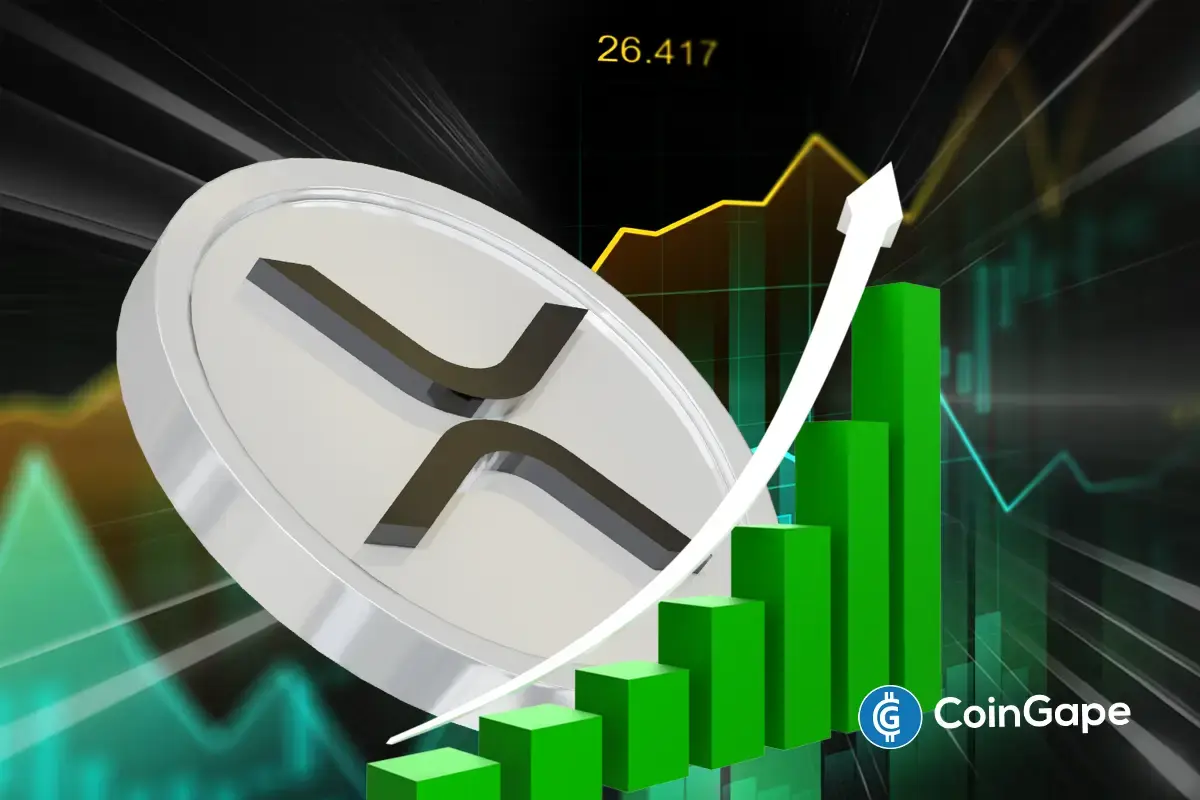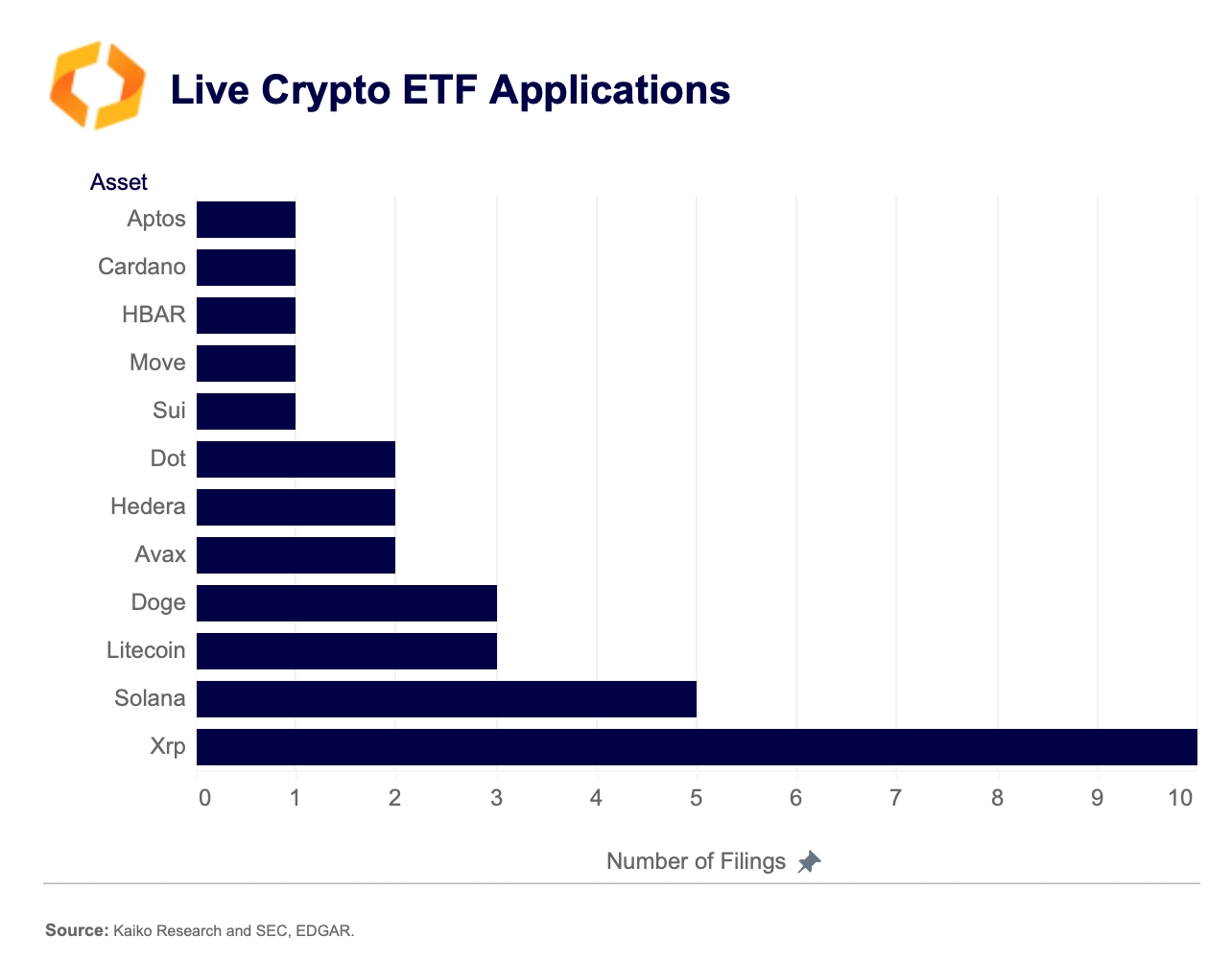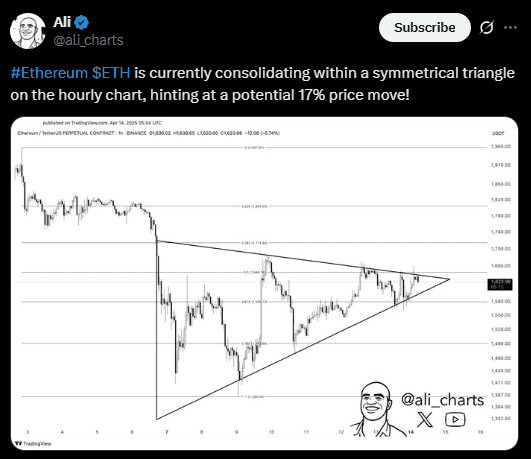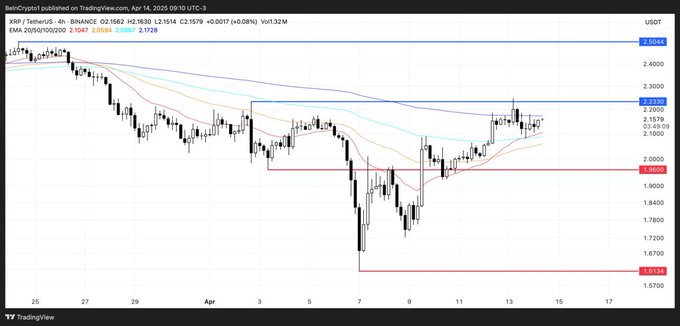24/7 Cryptocurrency News
Jack Dorsey’s Block Boosts Bitcoin Mining Plans Amid Trump Win
Published
5 months agoon
By
admin
Block Inc., formerly known as Square, led by Jack Dorsey is redirecting its strategy to Bitcoin mining and self-custody wallets as it reduces its funding on the decentralized web projects and the music streaming app, Tidal. This strategic shift was made shortly after Trump’s win in the recent U.S. presidential election, which has positive sentiment in the cryptocurrency industry.
Trump supported the digital asset industry during his presidential campaign, and the struggling Bitcoin mining sector, which has been unprofitable since the halving in the first half of this year.
Block Prioritizes Bitcoin Mining and Wallet Development
According to Block’s third-quarter shareholder letter, the company decided to shift resources from Web5 and Tidal toBTC products. Block, which has been constructing mining equipment instead of mining the Bitcoin, plans to increase its impact within the industry through the manufacturing of mining equipment. This comes after Bitcoin Maxi Michael Saylor invited Microsoft CEO Satya Nadella to consider adding Bitcoin to the company’s investment portfolio.
The company disclosed that it had found a 3-nanometer mining chip in April 2024, which proved that the company is working towards enhancing mining technology for business use. In July this year, Core Scientific, one of the largest Bitcoin mining companies, said it would employ Block’s miners for its operations, suggesting high interest in Block’s products.
Furthermore, Block has also announced the intention to increase investment in Bitkey, a recently launched self-custody Bitcoin wallet introduced in March. Bitkey enables users to buy, sell, and hold Bitcoin with the ability to connect to Block’s Cash App and Coinbase platform. The emphasis on Bitkey is in line with Block’s vision of offering safer storage and transaction solutions for cryptocurrencies.
Decision to Wind Down Web5 and Tidal Investments
Block’s decision to shut down the Web5 project marks the end of an ambitious attempt to develop a decentralized internet framework. Web5, introduced in 2022, aimed to create technologies that support decentralized identity, personal data storage, and verifiable data exchange.
However, with limited progress and mounting competition in the blockchain-based internet space, Block has chosen to discontinue the project and allocate its resources to areas with stronger demand and clearer revenue prospects.
The company is also scaling back its investment in Tidal, the music streaming platform it acquired in 2021 for nearly $300 million. Tidal has undergone staff reductions in recent years, and Block’s leadership acknowledged that the platform had not met expectations for user growth and revenue. By reallocating funds from Tidal, Block aims to strengthen its financial position and channel resources toward its cryptocurrency initiatives.
Financial Performance and Market Reaction
Block’s third-quarter financial report revealed revenue of $5.98 billion, below analysts’ expectations of $6.24 billion, according to FactSet. This miss, coupled with the restructuring announcement, led to an initial 10% drop in Block’s share price in after-hours trading.
Although the stock recovered some losses, Block remains under pressure to demonstrate growth, especially as it faces competition from payment companies like PayPal and Stripe.
Revenue from Bitcoin and Cash App also fell short of projections, reporting $2.43 billion and $3.93 billion, respectively. Block attributed some of these results to a challenging market environment for digital assets. Despite these challenges, the company reported a 6% year-over-year revenue increase, reflecting steady growth in its core business.
Kelvin Munene Murithi
Kelvin is a distinguished writer with expertise in crypto and finance, holding a Bachelor’s degree in Actuarial Science. Known for his incisive analysis and insightful content, he possesses a strong command of English and excels in conducting thorough research and delivering timely cryptocurrency market updates.
Disclaimer: The presented content may include the personal opinion of the author and is subject to market condition. Do your market research before investing in cryptocurrencies. The author or the publication does not hold any responsibility for your personal financial loss.
Source link
You may like


Futureverse Acquires Candy Digital, Taps DC Comics and Netflix IP to Boost Metaverse Strategy


Court Grants Ripple And SEC’s Joint Motion To Suspend Appeal


AVAX Falls 2.1% as Nearly All Assets Trade Lower


What is a VTuber, and how do you become one in 2025?


Top Expert’s Update Sets $10 Target


How Academia Interacts With The Bitcoin Ecosystem
24/7 Cryptocurrency News
Court Grants Ripple And SEC’s Joint Motion To Suspend Appeal
Published
10 minutes agoon
April 16, 2025By
adminIn the latest development in the long-running XRP lawsuit, the US Court of Appeals has granted Ripple and the SEC’s joint motion to suspend their respective appeals. This will give both parties time to finalize the settlement in the long-running legal battle.
XRP Lawsuit: Court Grants Ripple & SEC’s Joint Motion
As revealed in a court document, the US Court of Appeals has granted Ripple and the US Securities and Exchange Commission’s (SEC) joint motion to hold the appeal in abeyance. The court has further directed the Commission to file a status report within 60 days of this order.
This court order consequently suspends the ongoing appeal and cross-appeal filed by the SEC and Ripple, respectively. As CoinGape reported, both parties had filed the joint motion to suspend the appeals in light of them reaching a settlement.
The SEC and Ripple argued that holding the appeal in abeyance will help conserve judicial and party resources while they both continue to pursue a negotiated resolution of this matter.
In March, Ripple agreed to drop its cross-appeal against the SEC following the latter’s decision to drop its appeal in the long-running XRP lawsuit. However, the matter is yet to be finalized as both parties revealed in the filing that they need additional time to obtain the Commission approval for their agreement-in-principle.
Once approved, both parties will still need to get an indicative ruling from the District Court. As part of the agreement, Ripple and the SEC had agreed that the former would only pay $50 million out of the $125 million penalty that Judge Analisa Torres awarded against the crypto firm. The Commission also agreed to request that Judge Torres lift the standard injunction that it imposed on Ripple.
Possible Reason For The Delay?
It remains unclear why the Commission has yet to approve the agreement in the XRP lawsuit. However, a possible reason could be that the SEC is holding out for Paul Atkins to assume office.
As CoinGape reported, the US Senate has confirmed Atkins as the next SEC Chair. The next step is for US President Donald Trump to sign off on the confirmation and swear him in as Gary Gensler’s successor.
Once the Commission approves the agreement, Ripple and the SEC will ask Judge Torres for relief from her earlier judgment. Once that happens, the Court of Appeals can strike out the appeal and remand the case to the District court for a full ruling on the agreement.
Boluwatife Adeyemi
Boluwatife Adeyemi is a well-experienced crypto news writer and editor who has covered topics that cut across several topics and niches. Boluwatife has a knack for simplifying the most technical concepts and making it easy for crypto newbies to understand. Away from writing, He is an avid basketball lover, a traveler and a part-time degen.
Disclaimer: The presented content may include the personal opinion of the author and is subject to market condition. Do your market research before investing in cryptocurrencies. The author or the publication does not hold any responsibility for your personal financial loss.
Source link
24/7 Cryptocurrency News
Ripple Whale Moves $63M As XRP Tops List for Spot ETF Approval
Published
1 day agoon
April 15, 2025By
admin
A large Ripple whale has moved 29,532,534 XRP, valued at $63.81 million, from an unknown wallet to Coinbase. This Ripple whale transfer comes at a time when XRP is making waves in the cryptocurrency market, positioning itself as one of the top candidates for a U.S. spot ETF approval.
XRP’s increasing liquidity and recent developments have placed it in direct competition with Solana (SOL) for ETF approval, with analysts predicting XRP may secure approval sooner than its rivals.
XRP’s Growing Liquidity Boosts ETF Prospects
XRP has shown a marked improvement in liquidity over the past few months, positioning itself as a strong contender for a U.S. spot ETF. A study of market depth done by Kaiko Indices shows that XRP and Solana have the deepest 1% market depth on vetted exchanges. XRP’s liquidity has increased since late 2024, outperforming that of Solana and even risen to two times that of Cardano’s ADA.
Several events have enhanced XRP’s liquidity, such as Teucrium’s launching of a 2x XRP ETF in the recent past. This leveraged product tracks European ETPs and swap agreements, offering double the daily returns of XRP.
On the launch date, it traded above $5 million, becoming the best-performing fund for the Teucrium Fund Company. Such momentum brings XRP the vital support for its objective to establish a place in the approval process for the U.S. spot ETF.


Despite the absence of a robust futures market, as seen in BTC, XRP has gradually made an increased impression in the US spot market. This triggered the token’s market share to go to the highest level since the SEC lawsuit in 2021, which triggered multiple delistings.
In this regard, Solana’s market share has decreased to 16% from the 25-30% recorded in 2022. According to analysts, XRP continues to trade significantly in the spot market, which could pave the way for approval soon.
Ripple’s Push for ETF Approval
The SEC has approved various filings for XRP spot ETFs, with a key deadline for Grayscale’s amendment scheduled for May 22. Additional good news came from the regulatory channel, confirming Paul Atkins as the new SEC Chair. Since several deadlines are set for the ETFs in the cryptocurrency market, Atkins’ leadership could determine the fate of XRP and other assets.
XRP’s situation differs from Bitcoin’s, as it lacks a robust futures market, making the cryptocurrency’s regulatory landscape more complex. However, rising liquidity and introducing the 2x XRP ETF have shifted the narrative firmly towards Ripple’s token. Therefore, the steps taken by the SEC in reaction to Grayscale’s filing will set the direction through which XRP may or may not get approval.
Despite this, according to data from Polymarket, there is a 74% chance that XRP will be approved for a spot ETF by December 31, 2025. However, there is still cautious optimism in the option market for XRP.
Data from Deribit reveals an abundance of bear call options, indicating that traders mainly hedge against further downside. This is partly due to worries from the broader market, such as macroeconomic issues that may affect crypto assets, like the Trump tariffs.
XRP Price Trend Amid Ripple Whale Moves
Looking at the technical analysis of the XRP price, there are indications of purely bullish opportunities. According to crypto analyst TheDefilink, XRP price is presently trading above key support levels on the daily charts, and as signified by the Ichimoku Cloud, the trend remains bullish.
In addition, large token transfers mean that Ripple whales are active on the market. The latest 29 million XRP transferred to Coinbase, alongside the 70 million XRP transfer between two unknown wallets, also depicts interest in XRP.
Additionally, the tightening of XRP’s Exponential Moving Averages (EMAs) suggests a potential golden cross could be forming, a pattern often associated with upward price movements.
According to the analyst, XRP price resistance levels are $2.23 and $2.50, with support levels at $1.96 and $1.61. A successful move above the $2.23 resistance could further energize the bullish sentiment surrounding XRP, aligning with a recent CoinGape XRP price analysis.
However, failure to hold the $1.96 support level might lead to a shift in market sentiment, potentially triggering a bearish correction in the short term.
Kelvin Munene Murithi
Kelvin is a distinguished writer with expertise in crypto and finance, holding a Bachelor’s degree in Actuarial Science. Known for his incisive analysis and insightful content, he possesses a strong command of English and excels in conducting thorough research and delivering timely cryptocurrency market updates.
Disclaimer: The presented content may include the personal opinion of the author and is subject to market condition. Do your market research before investing in cryptocurrencies. The author or the publication does not hold any responsibility for your personal financial loss.
Source link
24/7 Cryptocurrency News
Here’s Why a Massive Ethereum Price Rally is Next
Published
1 day agoon
April 15, 2025By
admin
Despite being the second biggest cryptocurrency, Ethereum has witnessed the worst quarterly price performance of 5 years in Q1 2025. With continuous bears’ dominance and macroeconomic events putting downward pressure on the altcoin, it is down significantly. However, that might change as the ETH price chart shows a bullish sign.
Ethereum Price Up for Rally As Buying Signal Flashes
Ethereum’s downtrend resulted in the token’s crashing to a low of $1,400 earlier in the month. Experts have attributed this fall to investors’ bearish sentiments and the overall crypto market crash. However, the Ethereum price drop against Bitcoin to its lowest in years indicates underlying performance issues.
While the selling sentiments remain, a buy signal has formed in the ETH price chart, presenting the possibility of a rebound. According to the crypto analyst Ali Martinez’s X post, the TD sequential indicator is presenting Setup 9, i.e., an indicator of trend reversal.
ETH may be gearing up for a major rebound, with the TD Sequential flashing a buy signal on the weekly chart!

The “9” is historically proven to mark the end of the bearish trend and present buying opportunities. Moreover, the smaller body size of the candle suggests weakening selling pressure and traders opting to buy.
Besides, no major resistance near the chart exists, so a smooth uptrend can form unless any major macroeconomic event interferes.
Symmetrical Triangle Formation Supports Ethereum Price’s Bullish Outlook
With a 3% recovery over the week, Ethereum currently trades at $1,639.91 with a market capitalization of $197.88B. Although the recovery is slow, the token moves in a symmetrical triangle formation, simultaneously opening the possibility of an uptrend or a downtrend.
If the ETH price moves up, it could rally to $1,900, but a downside move could result in a crash to $1,380. Although uncertainty remains amid Trump’s tariff trade war, the long-term bullish Ethereum price prediction is sustained.

Considering the same, a crypto whale has just opened a $12.6M ETH Long with 5x leverage, influencing investors’ sentiments.
Frequently Asked Questions (FAQs)
Persistent berish investor sentiments, broader crypto market crash, and macroeconomic events drive the poor performance of Ethereum.
After a 3% recovery during the week, Ethereum currently trades at $1,639.91 but could hit $1,900 with the confirmation of bullish momentum.
The ETH price chart shows that investors’ buying interest is rising and selling sentiments are declining. Even whales are placing long leverage, showcasing rising confidence in the altcoin.
Pooja Khardia
With a deep-seated passion for reading and five years of experience in content writing, Pooja is now focused on crafting trending content about cryptocurrency market. As a dedicated crypto journalist, Pooja is constantly seeking out trending topics and informative statistics to create compelling pieces for crypto enthusiasts. Staying abreast of the latest trends and advancements in the field is an integral part of her daily routine, fueling a commitment to delivering timely and insightful coverage
Disclaimer: The presented content may include the personal opinion of the author and is subject to market condition. Do your market research before investing in cryptocurrencies. The author or the publication does not hold any responsibility for your personal financial loss.
Source link

Futureverse Acquires Candy Digital, Taps DC Comics and Netflix IP to Boost Metaverse Strategy
Court Grants Ripple And SEC’s Joint Motion To Suspend Appeal

AVAX Falls 2.1% as Nearly All Assets Trade Lower

What is a VTuber, and how do you become one in 2025?

Top Expert’s Update Sets $10 Target

How Academia Interacts With The Bitcoin Ecosystem

AB DAO and Bitget Launch Dual Reward Campaign, Distributing $2.6M Worth of $AB Globally

AI crypto tokens at risk as Nvidia faces restrictions on China exports

Coinbase Urges Australia to Vote for Crypto Progress in May

How High Would Pi Network Price Go If Pi Coin Adopts Transparency to Avoid Mantra Pitfalls

XRP’s ‘Rising Wedge’ Breakdown Puts Focus on $1.6 Price Support

China selling seized crypto to top up coffers as economy slows: Report

Ethereum Price Dips Again—Time to Panic or Opportunity to Buy?

The Inverse Of Clown World”

Bitcoin Indicator Flashing Bullish for First Time in 18 Weeks, Says Analyst Who Called May 2021 Crypto Collapse

Arthur Hayes, Murad’s Prediction For Meme Coins, AI & DeFi Coins For 2025

Expert Sees Bitcoin Dipping To $50K While Bullish Signs Persist

Aptos Leverages Chainlink To Enhance Scalability and Data Access

Bitcoin Could Rally to $80,000 on the Eve of US Elections

Crypto’s Big Trump Gamble Is Risky

Sonic Now ‘Golden Standard’ of Layer-2s After Scaling Transactions to 16,000+ per Second, Says Andre Cronje

Institutional Investors Go All In on Crypto as 57% Plan to Boost Allocations as Bull Run Heats Up, Sygnum Survey Reveals

Ripple-SEC Case Ends, But These 3 Rivals Could Jump 500x

3 Voting Polls Show Why Ripple’s XRP Price Could Hit $10 Soon

Has The Bitcoin Price Already Peaked?

A16z-backed Espresso announces mainnet launch of core product

The Future of Bitcoin: Scaling, Institutional Adoption, and Strategic Reserves with Rich Rines

Xmas Altcoin Rally Insights by BNM Agent I

Blockchain groups challenge new broker reporting rule

I’m Grateful for Trump’s Embrace of Bitcoin
Trending

 24/7 Cryptocurrency News5 months ago
24/7 Cryptocurrency News5 months agoArthur Hayes, Murad’s Prediction For Meme Coins, AI & DeFi Coins For 2025

 Bitcoin3 months ago
Bitcoin3 months agoExpert Sees Bitcoin Dipping To $50K While Bullish Signs Persist

 24/7 Cryptocurrency News3 months ago
24/7 Cryptocurrency News3 months agoAptos Leverages Chainlink To Enhance Scalability and Data Access

 Bitcoin5 months ago
Bitcoin5 months agoBitcoin Could Rally to $80,000 on the Eve of US Elections

 Opinion5 months ago
Opinion5 months agoCrypto’s Big Trump Gamble Is Risky

 Altcoins3 months ago
Altcoins3 months agoSonic Now ‘Golden Standard’ of Layer-2s After Scaling Transactions to 16,000+ per Second, Says Andre Cronje

 Bitcoin5 months ago
Bitcoin5 months agoInstitutional Investors Go All In on Crypto as 57% Plan to Boost Allocations as Bull Run Heats Up, Sygnum Survey Reveals

 Price analysis5 months ago
Price analysis5 months agoRipple-SEC Case Ends, But These 3 Rivals Could Jump 500x




✓ Share: